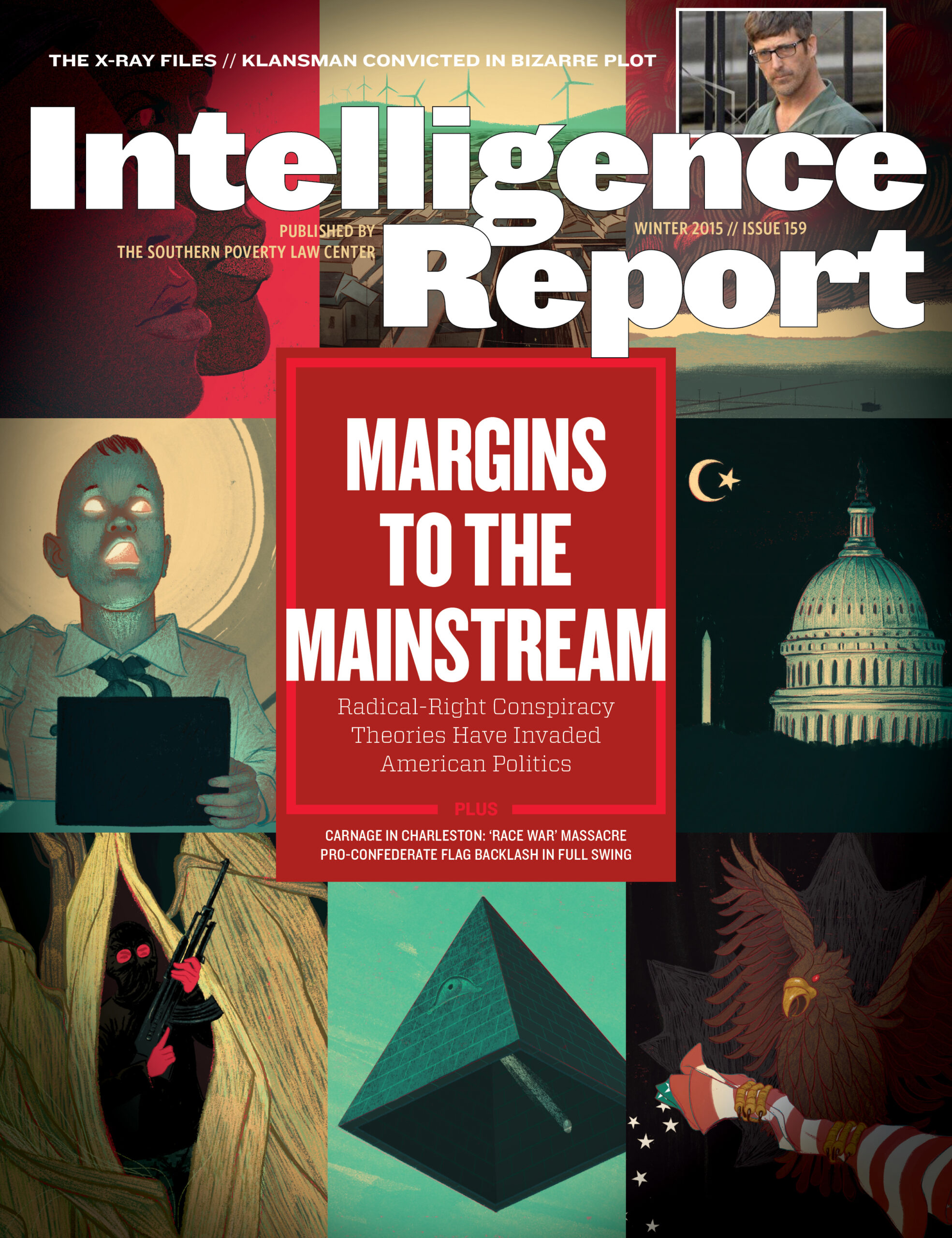Who, exactly, is Donald Trump appealing to?
In the first months of his Republican presidential campaign, the demagogic New York billionaire has poured boiling vitriol on anyone who dared to criticize him, proposed a crude immigration plan that virtually all sensible observers see as brutal and also completely unrealistic, and said that we can simply trust that his solutions for any number of other problems will be “terrific.”
And while the vast majority of analysts agree that he cannot win the GOP nomination, let alone the presidency, it seems obvious that he is damaging the party and its future. In the words of the widely read conservative commentator George Will, “Every sulfurous belch from the molten interior of the volcanic Trump phenomenon injures the chances of a Republican presidency.”
But Trump, so far, is leading the Republican field.
Although he has not asked for its support, he has won the applause of virtually the entire white nationalist movement, as we detail in this issue. But his appeal is clearly far broader than that. A hyper-nationalist, Trump has tapped into the anger of a growing constituency who see globalization changing the racial, religious and economic dynamics of the world around them. It is a phenomenon being replicated in Europe, where radical nationalist politics also are on the rise.
But part of it is also related to specifically American conditions, including the loss of a white U.S. majority that is expected over the course of the next three decades. As Thomas Edsall, a longtime and trenchant analyst of the far right, wrote in a New York Times opinion piece recently: “[T]he more important truth is that a half-century of Republican policies on race and immigration have made the party the home of an often angry and resentful white constituency — a constituency that is now politically mobilized in the face of demographic upheaval.”
Large portions of that constituency are not merely resentful. Operating in the absence of actual facts, or gleaning their information from a world of conspiracy-oriented websites and clueless “news” organizations, these men and women see the world as shaped by nefarious conspiracies — from secret Mexican plans to reconquer the American Southwest, to government plots to force the United States into a one-world government called the “New World Order,” to national educational standards supposedly designed to make our children communists.
A September survey by Public Policy Polling measured Trump supporters’ affinity for baseless conspiracy theories directly. It found that 66% of them believe President Obama is secretly Muslim and 61% think he was not born in the United States — significantly higher numbers than for all Republicans.
And Trump is at home in that world. After all, in 2011 he repeatedly asserted that Obama was not born in America, and therefore was not eligible for the presidency — this despite a mountain of evidence, including a birth announcement in a Hawaiian newspaper. Trump had investigators working in Hawaii, he told one reporter, who were unearthing the truth. “They can’t believe what they’re finding,” he boasted. But that was the end of that. He never mentioned them again.
Even in 2015, long after Obama released his full birth certificate and after saying he no longer wanted to discuss the issue, Trump still was unsure if the president was lying. “I don’t know, I really don’t know,” he said.
Trump also has repeatedly attacked the Common Core educational standards, a favorite bogeyman of the far right, many of whose denizens think they are actually part of a plot to turn American children into mindless “global citizens.”
And, rejecting the conclusions of a consensus of scientists, he sneers at the very idea of global warming. During a cold spell in 2014, for instance, he tweeted: “This very expensive GLOBAL WARMING bullshit has got to stop. Our planet is freezing, record low temps, and our GW scientists are stuck in ice.”
In this issue, we take a look at 10 major conspiracy theories that originated on the radical right but have made their way into the American political mainstream. These baseless theories are today being pushed not merely by hyperventilating conspiracists like the radio host Alex Jones. They are being enabled by shocking numbers of politicians and others in the public square — people like Donald Trump.
The problem with conspiracy theories is that they substitute ignorance and suspicion for knowledge and reason, making it vastly more difficult for us to solve the very serious problems that face us. If we really believe that global warming is a hoax, the chances of solving the problem are slim indeed. If we think Mexico has secret invasion plans, fixing our immigration system may be impossible.
In the end, Donald Trump may be sidelined and leave the political arena he has dominated for most of this summer. But the anger he has tapped into is likely to shape the American body politic for years to come.



